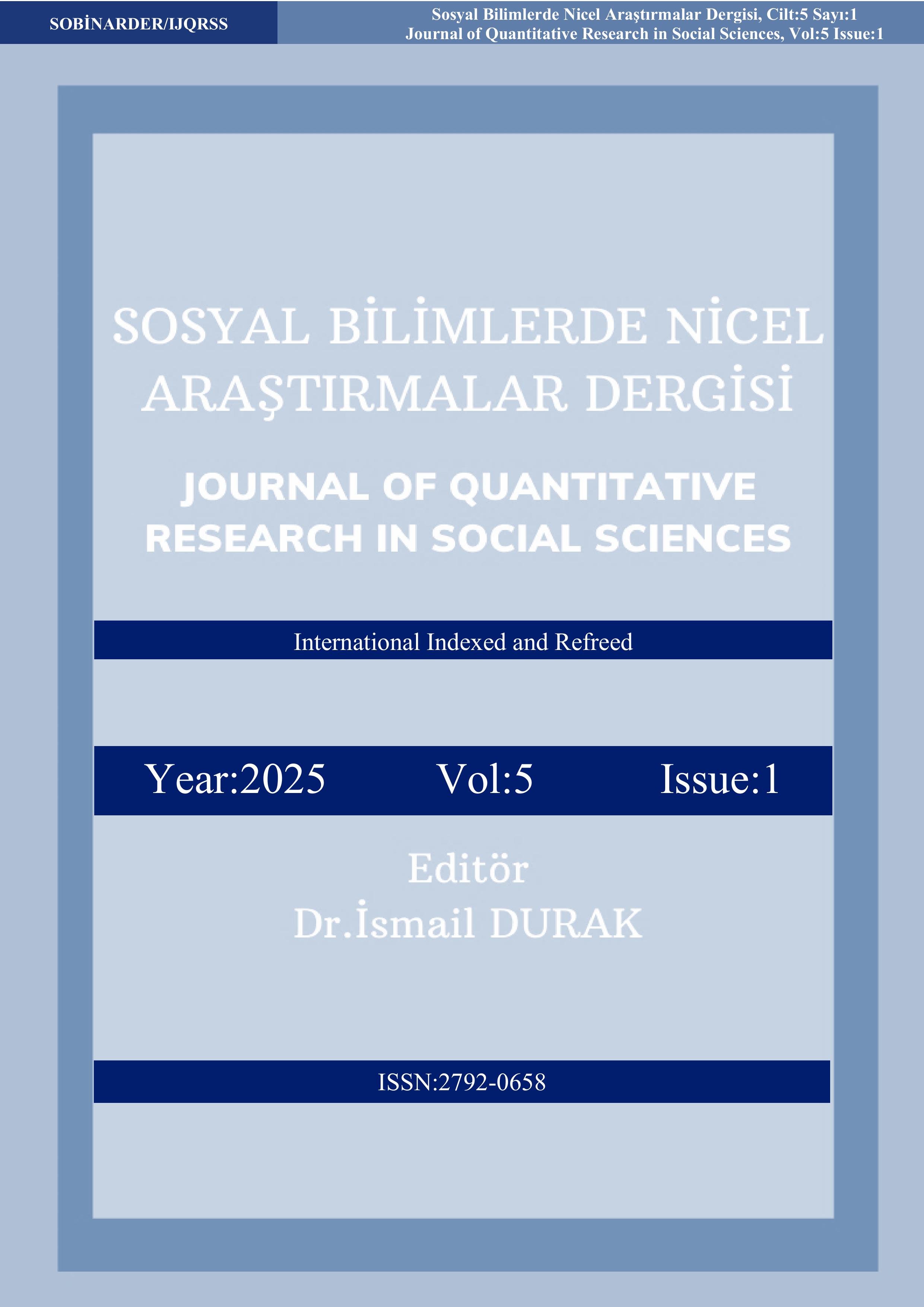The Moderating Role of Perceived Supervisor Support in the Relationship Between Job Stress and Emotional Exhaustion: A Study on Hotel Employees
İş Stresinin Duygusal Tükenmişlik Üzerindeki Etkisinde Algılanan Yönetici Desteğinin Düzenleyici Rolü: Alanya’daki Otel Çalışanlarına Yönelik Bir Araştırma
Keywords:
Job stress, Emotional exhaustion, Perceived supervisor support, AlanyaAbstract
The aim of this study is to reveal the moderating role of perceived supervisor support in the effect of job stress on emotional exhaustion. The scope of the research consists of personnel working in five-star hotel enterprises operating in Alanya. In the data collection process, the convenience sampling method was adopted, and the data were collected through a questionnaire technique. Within the scope of the study, questionnaire forms were hand-delivered to the human resources departments of 15 hotels in Alanya that agreed to participate in the research. The human resources departments distributed the questionnaires to the hotel employees, and the completed forms were returned to the same departments by the employees. The completed questionnaires were then collected in person from the relevant units by the researcher. As a result of this process, 418 questionnaires were obtained from the employees. In the analysis of the data, the partial least squares (PLS) method, a type of structural equation modeling (SEM) approach, was applied using the SmartPLS software. The analysis results revealed that job stress has a positive and strong effect on emotional exhaustion, and that perceived supervisor support has a moderating effect on the relationship between job stress and emotional exhaustion. The findings are expected to contribute to the development of more effective strategies by hotel enterprises to prevent job stress and emotional exhaustion. In particular, the findings regarding how perceived supervisor support functions as a balancing factor in preventing employees from experiencing emotional exhaustion in the face of job-related stress offer important practical implications for improving human resource practices and reshaping managerial approaches.
References
Anderson, B., Chappel, S., & Provis, C. (2002). The recognition and management of emotional labour in the tourism industry. CRC for Sustainable Tourism Gold Coast, Qld.
Anderson, J. C., & Gerbing, D. W. (1988). Structural equation modeling in practice: A review and recommended two-step approach. Psychological Bulletin, 103(3), 411–423.
Aydoğan, O. (2008). İş Stresinin Tükenmişlik ve Örgütsel Bağlılıkla İlişkisi: Kamu Sektöründe Bir Uygulama. (Yüksek lisans tezi). Kara Harp Okulu/ Savunma Bilimleri Enstitüsü, Ankara.
Babin, B. J., & Boles, J. S. (1996). The effects of perceived co-worker involvement and supervisor support on service provider role stress, performance and job satisfaction. Journal of Retailing, 72(1), 57-75.
Beehr, T. A., & Franz, T. M. (1987). The current debate about the meaning of job stress. Journal of Organizational Behavior Management, 8(2), 5–18.
Beehr, T. A., & Newman, J. E. (1978). Job stress, employee health, and organizational effectiveness: A facet analysis, model, and literature review. Personnel Psychology, 31(4), 665–699.
Beehr, T. A., King, L. A., & King, D. W. (1990). Social support and occupational stress: Talking to supervisors. Journal of Vocational Behavior, 36(1), 61–81.
Bernhardt, A., Dresser, L. ve Hatton, E. (2003). The coffee pot wars: unions and firm restructuring in the hotel industry. Appelbaum, E., Bernhardt, A. ve Murnane, R. (Ed.), Low-wage America: How employers are reshaping opportunity in the workplace (s.33-76). New York: Russell Sage Foundation.
Bhanthumnavin, D. (2003). Perceived social support from supervisor and group members’ psychological and situational characteristics as predictors of subordinate performance in Thai work units. Human Resource Development Quarterly, 14(1), 79–97.
Brislin, R. W. (1970). Back-translation for crosscultural research. Journal of Cross-Cultural Psychology, 1(3), 185-216.
Bunker, D. R., & Wijnberg, M. (1985). The supervisor as a mediator of organizational climate in public social service organizations. Administration in Social Work, 9(2), 59–72.
Chiang, F. F., Birtch, T. A., & Kwan, H. K. (2010). The moderating roles of job control and work-life balance practices on employee stress in the hotel and catering industry. International Journal of Hospitality Management, 29(1), 25–32.
Cullen, F. T., Link, B. G., Wolfe, N. T., & Frank, J. (1985). The social dimensions of correctional officer stress. Justice Quarterly, 2(4), 505–533.
Eisenberger, R., Stinglhamber, F., Vandenberghe, C., Sucharski, I. L., & Rhoades, L. (2002). Perceived supervisor support: Contributions to perceived organizational support and employee retention. Journal of Applied Psychology, 87(3), 565-573.
Falk, R. F., & Miller, N. B. (1992). A primer for soft modeling. Ohio: University of Akron Press.
Farber, B. A. (1983). Stress and burnout in the human service professions. Pergamon Press
Faulkner, B., & Patiar, A. (1997). Workplace induced stress among operational staff in the hotel industry. International Journal of Hospitality Management, 16(1), 99–117.
Folkman, S., & Moskowitz, J. T. (2000). Stress, positive emotion, and coping. Current Directions in Psychological Science, 9(4), 115–118.
Fornell, C., & Larcker, D. F. (1981). Evaluating structural equation models with unobservable variables and measurement error. Journal of Marketing Research, 18(1), 39-50.
Freudenberger, H. J. (1974). Staff burnout. Journal of Social Issue, 30, 159-165.
Giray, M. D., & Sahin, D. N. (2012). Algılanan örgütsel, yönetici ve çalışma arkadaşları desteği ölçekleri: Geçerlik ve güvenirlik çalışması. Türk Psikoloji Yazıları, 15(30), 1-9.
Golparvar, M. (2016). Unconventional functions of deviant behaviors in the relationship between job stress and emotional exhaustion: Three study findings. Current Psychology, 35(3), 269–284.
Hair, J. F., Hult, G. T. M., Ringle, C. M., & Sarstedt, M. (2017). A primer on partial least squares structural equation modeling (PLS-SEM) (Second edition). SAGE.
Haynes, P., & Fryer, G. (1999). Changing patterns of HRM and employment relations in New Zealand: The large hotel industry. Asia Pacific Journal of Human Resources, 37(2), 33–43.
Henseler, J., Ringle, C. M., & Sarstedt, M. (2015). A new criterion for assessing discriminant validity equation modeling. Journal of the Academy of Marketing Science, 43(1), 115-135.
Hu, H. H., & Cheng, C. W. (2010). Job stress, coping strategies, and burnout among hotel industry supervisors in Taiwan. The International Journal of Human Resource Management, 21(8), 1337–1350.
Hu, L., & Bentler, P. M. (1999). Cutoff criteria for fit indexes in covariance structure analysis: Conventional criteria versus new alternatives. Structural Equation Modeling: A Multidisciplinary Journal, 6(1), 1–55.
Ivancevich, J. M., Matteson, M. T., & Konopaske, R. (1990). Organizational behavior and management. New-York: McGraw-Hill.
Jamal, M. (1990). Relationship of job stress and type-a behavior to employees’ job satisfaction, organizational commitment, psychosomatic health problems, and turnover motivation. Human Relations, 43(8), 727–738.
Kim, H. J., Shin, K. H., & Umbreit, W. T. (2007). Hotel job burnout: The role of personality characteristics. International Journal of Hospitality Management, 26(2), 421–434.
Lee, J. J., & Ok, C. (2012). Reducing burnout and enhancing job satisfaction: Critical role of hotel employees’ emotional intelligence and emotional labor. International Journal of Hospitality Management, 31(4), 1101–1112.
Lo, K., & Lamm, F. (2005). Occupational stress in the hospitality industry- an employment relations perspective. New Zealand Journal of Employment Relations, 30(1), 23–47.
Maslach, C., & Goldberg, J. (1998). Prevention of burnout: New perspectives. Applied and Preventive Psychology, 7(1), 63–74.
Maslach, C., & Jackson, S. E. (1981). The measurement of experienced burnout. Journal of Organizational Behavior, 2(2), 99–113.
Maslach, C., & Leiter, M. P. (2008). Early predictors of job burnout and engagement. Journal of Applied Psychology, 93(3), 498-512.
Maslach, C., Jackson, S. E., & Leiter, M. P. (1997). Maslach burnout inventory. Third edition. In C. P. Zalaquett & R. J. Wood (Eds.), Evaluating stress: A book of resources (pp. 191–218). Scarecrow Education.
Maslach, C., Schaufeli, W. B., & Leiter, M. P. (2001). Job burnout. Annual Review of Psychology, 52, 397-422.
Munc, A., Eschleman, K., & Donnelly, J. (2017). The importance of provision and utilization of supervisor support. Stress and Health, 33(4), 348–357.
Oktug, Z. (2017). The moderating role of employees’ humor styles on the relationship between job stress and emotional exhaustion. International Business Research, 10(4), 131-138.
Parray, Z. A., Islam, S. U., & Shah, T. A. (2023). Impact of workplace incivility and emotional exhaustion on job outcomes–A study of the higher education sector. International Journal of Educational Management, 37(5), 1024–1041.
Rasoolimanesh, S. M., & Ali, F. (2018). Partial least squares-structural equation modeling in hospitality and tourism. Journal of Hospitality and Tourism Technology, 9(3), 238-248.
Rhoades, L., & Eisenberger, R. (2002). Perceived organizational support: A review of the literature. Journal of Applied Psychology, 87(4), 698–714.
Schabracq, M. J., Winnubst, J. A. M., & Cooper, C. L. (Eds.). (2002). The handbook of work and health psychology (1st ed.). Wiley.
Stout, J. K. (1984). Supervisors’ structuring and consideration behaviors and workers’ job satisfaction, stress, and health problems. Rehabilitation Counseling Bulletin, 28(2), 133–138.
Stranks, J. (2005). Stress at work management and prevention. London: Elsevier Book Aid International.
Suan, L. C., & Nasurdin, M. A. (2016). Supervisor support and work engagement of hotel employees in Malaysia: Is it different for men and women? Gender in Management: An International Journal, 31(1), 2–18.
Taormina, R. J., & Kuok, A. C. H. (2009). Factors related to casino dealer burnout and turnover intention in Macau: Implications for casino management. International Gambling Studies, 9(3), 275–294.
Yeh, S. S., Guan, X., Chiang, T. Y., Ho, J. L., & Huan, T. C. T. (2021). Reinterpreting the theory of planned behavior and its application to green hotel consumption intention. International Journal of Hospitality Management, 94, 102827.
Zhou, Q., Martinez, L. F., Ferreira, A. I., & Rodrigues, P. (2016). Supervisor support, role ambiguity and productivity associated with presenteeism: A longitudinal study. Journal of Business Research, 69(9), 3380–3387.
Downloads
Published
How to Cite
Issue
Section
License
Copyright (c) 2025 Journal of Quantitative Research in Social Sciences

This work is licensed under a Creative Commons Attribution-NonCommercial 4.0 International License.
Telif hakkı hakkında










